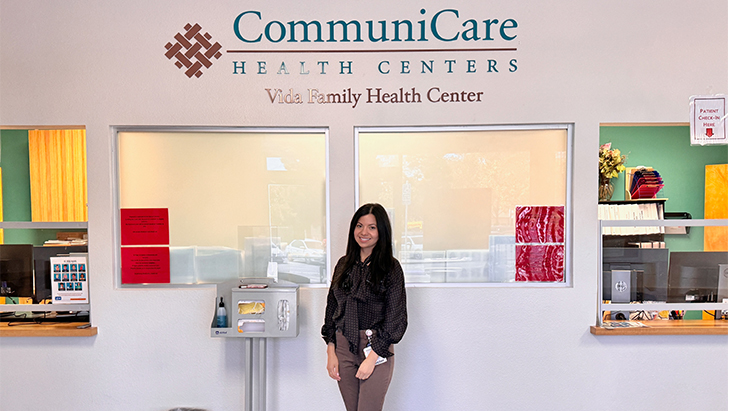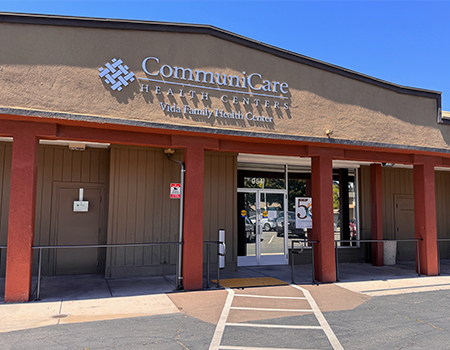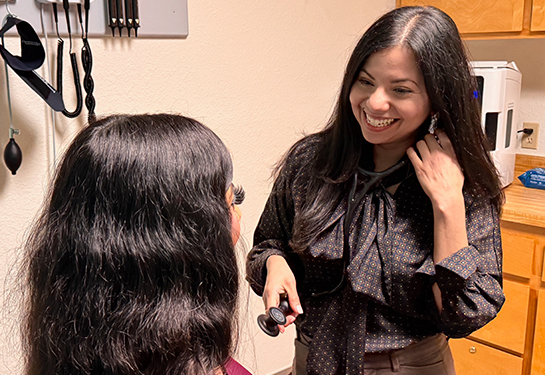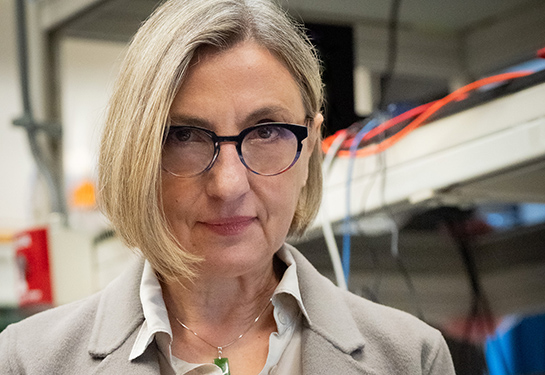New family medicine residency training site cares for underserved patients in West Sacramento
Program is a partnership between UC Davis Health and CommuniCare+OLE
Lizbeth Guillen moved to California from Mexico at the age of 12. She learned English in middle school. Whenever she’d get sick, her family couldn’t easily access a primary care doctor. For a while, she was undocumented.
Today, Guillen is a UC Davis Health family medicine resident physician. She cares for patients with a similar background to hers at the nonprofit CommuniCare+OLE’s Vida Family Health Center in West Sacramento. About 60% of her patients are Spanish-speaking immigrants. “I can relate to them because I was in their position, too,” Guillen said in her clinic office. “To me, it’s a privilege to work here and make a difference in people’s lives, because I know how difficult it can be.”
Guillen is one of four, first-year residents from the UC Davis Health Department of Family and Community Medicine assigned to work at CommuniCare+OLE. The nonprofit has clinics in Napa, Solano and Yolo counties, including Vida.
The Vida Family Health Center will eventually host a total of 12 residents at any given time through an arrangement in which UC Davis Health plays a major role: Every resident at Vida is from UC Davis and their physician supervisors are part of the residency program — whether they are employed by UC Davis or CommuniCare+OLE.
The successful partnership between UC Davis Health and CommuniCare+OLE has been growing for years and this latest collaboration with Vida will celebrate its first anniversary this summer. It’s one of the newest examples of a “win-win” for both the health clinic and the residency program: Residents gain experience with a diverse patient base and patients gain greater access to culturally sensitive providers.

The CommuniCare+OLE partnership is modeled after the family medicine residency clinic at One Community Health in Sacramento, which started nearly three years ago.
For decades, family medicine residents cared for patients almost exclusively at the UC Davis Health campus in Sacramento, whether in the hospital or at an outpatient clinic. But now residents can see patients with a wider range of social determinants of health, ailments and socioeconomic backgrounds at the off-campus community health centers.
“All of our residents are embedded in community clinics serving a majority of Medi-Cal, or underinsured, or uninsured folks,” said Micaela “Mika” Godzich, the UC Davis family medicine residency program director.
“They are working in the community and learning how to care for historically marginalized and underserved populations so that they can feel comfortable providing that care when they graduate from residency and serve the population of California,” added Godzich, an associate clinical professor in the Department of Family and Community Medicine.
Continuity clinic: A benefit for residents
The CommuniCare+OLE and One Community Health assignments are considered continuity clinics for UC Davis residents, a key component in a training program. It means the trainees can spend the majority of their three-year residency in a single place, seeing the same patients on a regular basis.
The continuity model allows Guillen to build meaningful relationships with her Latino patients, who range from infants to adults in their 80s. Research shows that patients who have good relationships with their providers experience better health outcomes.
“The patients really feel comfortable with a physician who looks like them, or speaks the same language,” Guillen noted.
Other trainees often choose UC Davis for family medicine residency because they’re eager to care for patients from vulnerable and marginalized populations, such as the immigrants and refugees at Vida.
“Caring for this population allows residents to build the skills needed to be really good primary care clinicians,” said Upal Sarker, the Vida clinic director and a UC Davis Health assistant clinical professor. “The residents really want this kind of experience,” added Sarker, who is also site lead for residents at CommuniCare+OLE.
The partnership contributes to FQHC physician pipeline
Vida Family Health Center sits at the busy corner of Jefferson Boulevard and Sacramento Avenue, in an aging strip mall anchored by a grocery store where Latino shoppers cash checks and pay utility bills. The clinic is across the street from a large church for West Sacramento’s growing Russian population.

CommuniCare, as the Yolo County health care organization was known before recently merging with Napa-based OLE Health, has been in the mall intermittently since 1988. But, as with other Federally Qualified Health Centers (FQHCs), new physician recruitment has been challenging. Most new doctors opt for higher paying jobs elsewhere. Or they may start their career in an FQHC that qualifies them for federal or state loan repayment, then leave when they’ve met their contractual obligation.
But with the new program, clinic leaders say, the formal UC Davis Health partnership could be a helpful recruitment tool. After all, numerous community-minded UC Davis residents are routinely hired at clinics they passed through as part of their training. Sarker, a family medicine physician, trained temporarily at CommuniCare clinics in Woodland and West Sacramento during his UC Davis residency eight years ago, in a much less formal arrangement than exists today.
“So many of our physicians are UC Davis grads, both from the medical school and the residency,” exclaimed W. Suzanne Eidson-Ton, the chief medical officer for CommuniCare+OLE and a clinical professor at UC Davis Health. “Being involved in a pipeline with UC Davis and having long-term relationships with learners is wonderful for our patients as well as our organization,” she said.
“The experience we provide residents in our clinic encourages many of them to work for us or other FQHCs after graduation, and we are proud of our contribution to the physician pipeline for underserved communities,” Eidson-Ton added.
Guillen, the resident who started in July, after graduating from the University of Nevada, Reno School of Medicine, can envision working at Vida or a similar clinic when she completes her training in about two years.
“Ever since I’ve been here, I have nothing but a great experience with my patients,” she said. And the feeling is mutual — her patient load is growing by word of mouth.
“This work is very, very rewarding. It takes me back right to when I came to this country and didn’t know how to speak English, and I still have a lot of family who don’t speak English,” she said. “I’m just so grateful to be here.”




